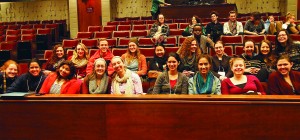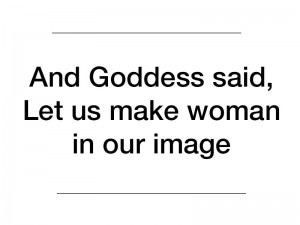Between February 6 and February 8, a group of 22 Houghton students attended Calvin College’s Faith and International Development Conference (FIDC) in Grand Rapids, Michigan.
According to Ndunge Kiiti, intercultural studies, Houghton students have been consistently attending this conference since 2006, though “we’ve missed maybe one (or maybe even two) years.” However while intercultural studies and political science faculty typically organize the trip to Calvin, this year the organization of the trip was mainly due to student initiatives from Sarah Slater and Hanna Kahler, juniors.
 Kahler was most interested in attending this conference because of the influence her older sister who attended a few years prior and found the conference to be “wonderful.” To Kahler, “it was always something on my bucket list.”
Kahler was most interested in attending this conference because of the influence her older sister who attended a few years prior and found the conference to be “wonderful.” To Kahler, “it was always something on my bucket list.”
However, because of budgetary problems, it appeared at the beginning of this year that the trip to Calvin might not run after all. According to Slater, “usually there’s several thousand dollars in the budget in the intercultural studies department to do a conference trip but there wasn’t that money allocated this year” which prompted Slater and Kahler to take charge.
Slater and Kahler were mostly in charge of raising funds across many organization on campus, which included the SGA, the Intercultural Studies department, and GCF, in order to help assist the costs of transportation. Said Slater, many of the challenges revolved around funding and “keeping sane” during the two and a half week period that she and Kahler were given to organize the trip.
The group representing Houghton at Calvin was the largest at the conference at 22 students. Compared with years past, there were also more diversity of Houghton’s majors represented. Said Slater, “I’m pleased that we had more majors than usual. Usually it is just upper-level intercultural and political science majors, but this year we also had students from business, art, psychology, and physical therapy. We had a lot of student diversity.” Slater was particularly pleased because, “Part of the nature of international development is that you’re trying to include everyone so I feel like a conference about international development should reflect that.”
The focus of the conference revolved around the idea of “cultivating community” and, according to the conference handbook, to answer the questions, “Who is cultivating community? How? Who belongs where? Why? What does community look like?” by looking at these questions through the light of “Christ’s work on the cross.”
The keynote speaker at the conference was Brian Fikkert, a professor of economics and community development and author of “When Helping Hurts: How to Alleviate Poverty Without Hurting the Poor… And Yourself.” Fikkert spoke about his work involving microfinancing in developing countries and also, in keeping with the theme of the conference, his core belief that human beings were made for relationships with God and each other.
Other speakers at the conference included: Rob and Tara Cahill, directors of Community Cloud Forest Conservation; Dr. Minus Hiruy of Hope University College in Ethiopia; and Tarek Abuata, Palestine Coordinator for the Christian Peacemakers Team.
For Kahler, “it was pretty cool to meet these professors that were foundational in their field and had written these books…. Overall, it was nice to get a feel for the development organizations that are out there.”


